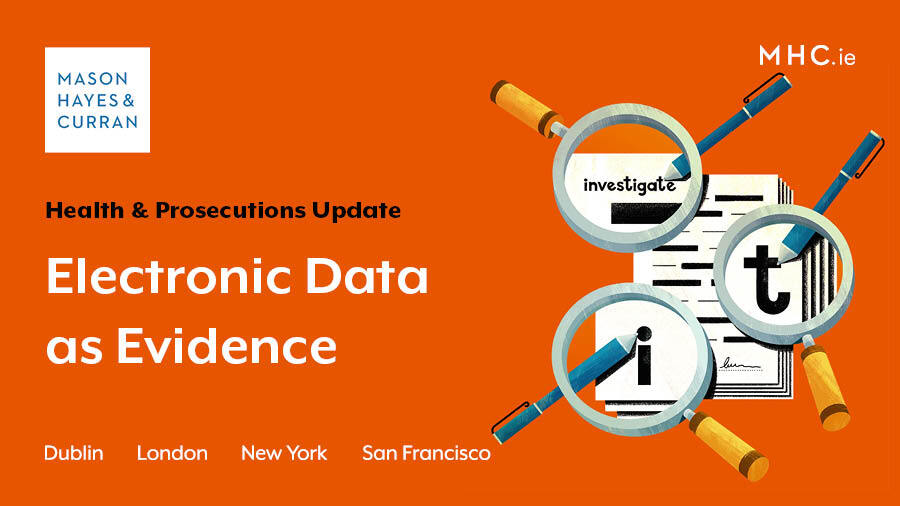
Our Health & Prosecutions team examines a recent Supreme Court decision which found that the seizure of a computer under a warrant to search a house in a widely reported murder trial was unlawful. We examine the Court’s rationale for arriving at the decision and its likely future impact on regulators and on corporations in possession of electronic data required as evidence in prosecutions.
The implications of Mr Justice Peter Charleton’s Supreme Court decision in DPP v Patrick Quirke are far reaching not least for corporations in possession of electronic data that might be required as evidence in criminal prosecutions. Regulators should be aware of their obligations to meet fundamental fairness tests under the Constitution and as set out by Mr Justice Charleton when applying for search warrants.
We discuss this judgement which considers the proportionality of warrant applications in terms of balancing the right to investigate serious crime with the privacy rights of an individual.
Background
Mr Quirke’s defence had appealed his conviction for murder. Their appeal centred on the fact that a computer and other digital devices taken from his home were not mentioned in the sworn information upon which the District Court had granted a search warrant to enter his home and to seize potential evidence.
There was also no mention of any digital devices in the draft warrant, despite the fact that this had been discussed by investigating police officers when preparing to apply for the warrant.
Through forensic analysis of the computer hard drive, it emerged that Mr Quirke had researched the decomposition of human remains and this then formed part of the prosecution's evidence at trial.
As argued by the defence, the District Court Judge who granted the search warrant was precluded from conducting a proportionality analysis between a right to privacy in this respect and the community’s right to investigate and prosecute crimes.
Decision
The key findings of Mr Justice Charleton’s important judgement were:
- A computer is not a place.
- The law cannot be distorted whereby the clear terms of a statutory search warrant power are altered so that a computer becomes a separate physical space from the dwelling in which it may be found.
- If the District Court Judge was informed at the warrant application that computer devices, which includes mobile phones and other digital instruments, were to be searched for and potentially seized, the District Judge would be entitled to infer that the purpose of search was to enable entry into the non-physical space controlled by the accused.
- The seizure for entry into the digital space involves the automatic loss of privacy rights on a vast scale.
- Without directing the mind of the judge to that virtual world, the seizure of the computer in the search of Mr Quirke’s home was unauthorised.
- If the investigating police officers wish to seize a computer in a house for which a valid warrant was issued, “that headline and necessarily blunt particularisation of that interest must be brought to the judge’s attention on applying for legal authority to authorise such an invasion of privacy”.
- The physical seizure of computer devices permits a departure from such physical testing and entry into a digital space where the thoughts and experiences of a suspect may be accessed. Such access is not physical, though contained in digital form on a device.
Conclusion
Courts need to scrutinise and balance conflicting societal and privacy rights in reviewing the reasons for seizure for a non-physical search into mobile phones and other computer devices. This is particularly the case in instances concerning devices of vast memory, and those which carry the private dimensions of a human life over years or months. This is especially important given that an application for a search warrant is made in the absence of the person impacted as to their rights.
State bodies and regulators should include in the sworn information accompanying an application for a warrant reference to searching and potentially seizing computer, mobile or similar devices for the purpose of downloading and analysing data found.
If you are or have been the subject of a dawn raid or search warrant where mobile phone and computers are seized you should review the court order and seek legal advice.
For more information and expert advice, contact a member of our Health & Prosecutions team.
The content of this article is provided for information purposes only and does not constitute legal or other advice.







